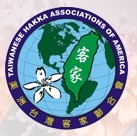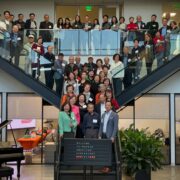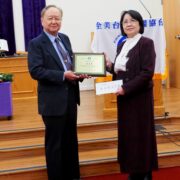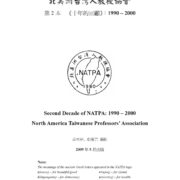More About the Taiwanese Hakka Association of America (THAA) and an Introduction to the Taiwan Hakka Association for Public Affairs in North America (HAPA-NA)
Author: William Wei
I am very grateful to Mr. Hsing-fu Wang for introducing the Taiwanese Hakka Associations of America in the 2010 Toronto Newsletter. In that article, he talked about how the Hakka community supported the creation of a joint US-Canada Hakka association in 2007, and how the Taiwanese Association of U.S.A. (THA-USA) was renamed to Taiwanese Hakka Associations of America (THAA). Mr. Wang was elected as THAA’s President in 2008, and he continued to serve the Hakka community by hosting the THAA Conference in Toronto in 2009. Of course, his introduction of the organization stopped after 2009.
The purposes of the Taiwanese Hakka Associations of America are: (1) To carry on the Hakka people’s excellent culture and traditional spirit. (2) To promote unity and cooperation within the Hakka community. (3) To advocate for freedom and democracy in Taiwan, and fight for ethnic minorities’ rights and dignity. (4) To promote harmony and unity between all Taiwanese people and enhance the international status of the Taiwanese people. Our logo represents the aspirations that we, as Taiwanese Hakka people, have for Taiwan.
Currently, there are a total of 21 Hakka Associations in THAA; 19 from the United States and 2 from Canada. Apart from promoting Hakka cultural policies in Taiwan, the association also cooperates with and encourages the activities of Hakka organizations in Europe, Asia, and South America. We also enthusiastically organize groups to participate in their Hakka events. For example, there were about 200 people who attended the 2016 European Taiwanese Hakka 5th Annual Conference, which was held in London this year. 107 of the attendees were from the US and Canada.
In addition to the previously mentioned activities, THAA’s most important work is to hold a Cultural Summer Conference about once a year, and another annual THAA Conference. These events unite the community, allowing friends and relatives to meet up and work together to continue the inheritance and development of Hakka culture. Since the THAA Conference also includes language and cultural programs, the last Cultural Summer Conference was held in 2006. Now, only the National THAA Conference is held once every other year. Since Mr. Hsing-fu Wang also wrote a detailed introduction of the association up until 2009, I needn’t say much about that period. I will use the same method of using a table to list the Taiwanese Hakka Association of America’s important events from 2010 up until the present. However, there are three things that need to be explained: (1) the THAA Conference usually uses THAA’s name. However, in 2012/2013, THAA President Edward J. S. Lin was also the President of the Taiwanese Hakka Associations of the World (THAW), so he called the conference the “Global Taiwanese Hakka Conference.” This case is an exception to the norm. (2) Conferences are usually held in the city where the Association President lives. Unfortunately, since there are very few Taiwanese American Hakka people in Philadelphia, there are usually only about ten or so people who participate in parties and events there. Philadelphia doesn’t have very many Hakka people, but New York is close, has a larger number of Hakka people, and hadn’t hosted a Hakka Conference as of 2015. Thus, 2014/2015 THAA President William Wei, who lived in the northern suburbs of Philadelphia, invited the Hakka Association of Greater New York to host the conference that year. This is also an exception to the norm. (3) The Taiwanese Hakka Association of U.S.A. and Taiwanese Hakka Associations of American are the main sponsors of the THAA Conference. The local Hakka Association where the conference is held are organizers of the event. The “President” listed below on the table are the Presidents of the Taiwanese Hakka Association of U.S.A. or Taiwanese Hakka Associations of America. The “Host” listed on the table in generally the President of the local Hakka Association that worked on preparations for the conference. If the THA-USA or THAA President that year was also the President of the hosting organization, then they are listed as both “President/Host.”
| Date | Event | President/Host | Location | Main topic |
| August 2011 | 8th THAA Conference – 2011 | President Mike Kwan/ Pi-wen Fan | Houston, TX | Hakka Origins Using Family Traditions to Revitalize the World |
| August 2013 | Global Taiwanese Hakka Conference (9th THAA Conference) – 2013 | President Edward J. S. Lin/ Rui-ling Chang | Chicago, IL | Cherishing the Tung Flower, Embracing the Entire World |
| August 2015 | 10th THAA Conference – 2015 | President William Wei/ Kai-rung Huang | New York City, NY | Hakka Family, Taiwanese Love |
Apart from the Taiwanese Hakka Associations of America, the North American Taiwanese Hakka people are also very proud of another Hakka organization: the Taiwan Hakka Association for Public Affairs in North America (HAPA-NA). When the Taiwan Hakka Association for Public Affairs was established on December 1st, 1990 in Taiwan, HAPA-NA was created by a group of Taiwanese American Hakka people who care a lot about both Taiwan and the Hakka people. In July 1991, during the Taiwanese American Conference – East Coast, a preparatory committee was established with Chiou-Hung Chen as its convener. The Taiwan Hakka Association for Public Affairs in North America was officially established on November 1st of that year, a month before the Taiwan Hakka Association for Public Affairs’ anniversary.
HAPA-NA’s purpose is to unite the Hakka people of North America, to assist in Hakka movements in Taiwan, to fight for Hakka rights, to pass on the Hakka language and culture, to promote public affairs work, and to work hard for Taiwan’s future. The association’s stated goals are: (1) To develop Hakka language and culture, and to fight for the rights of the Hakka people. (2) To jointly promote Taiwan’s Public affairs via overseas Hakka people and other linguistic minority groups from Taiwan. (3) To research special proposals and policies. (4) To give attention to the rights of Taiwanese Hakka people in North America. Thus, in accordance with its purpose and goals, after its establishment, HAPA-NA immediately began continuously working with THA-USA (predecessor to THAA) to form a group to return to Taiwan. The group worked with Hakka people and organizations in Taiwan, especially the Taiwan Hakka Association for Public Affairs, to launch a number of Hakka movements to fight for Hakka rights. As a result of these movements, the following things were established in succession: policy that mother tongues are taught in elementary school (1993), the Formosa Hakka Radio Station (1994), the Hakka Research Center (1999), the Hakka Affairs Council (2001), the College of Hakka Studies (2003), and the Hakka Television Station (2003). HAPA-NA spared no effort in supporting and encouraging Taiwanese Hakka language and culture; the association enthusiastically participated in various Taiwanese- and Taiwanese American-organized “love Taiwan, protect Taiwan” demonstrations and marches.
Since the start, HAPA-NA has had a very good organizational system. There were 48 founding members. Each member paid a membership of $200, which formed the association’s operating budget. Since then, the membership fee has stayed at $50 per year. Approximately 100 people have joined the association, including most of the leaders of Hakka Associations in North America. Currently, there are about 50 people who regularly pay membership without any complaints. Members and officers work on a completely volunteer basis. I sincerely admire every member who pays the membership fee. Since the establishment of HAPA-NA, all of the past Presidents have given their money, effort, and time to the association without complaints or regrets. These Presidents are: 1991, Chiou-Hung Chen; 1992-1993, Albert Jen-Yih Chu; 1994-1995, Po-shih Chung; 1996-1997, Joyce Weng; 1998-1999, Chen-sheng Chung; 2000-2002, Clyde Kiang; 2002-2004, Pao C. Hsu; 2005-2006, William Wei; 2007-2008, David Lai; 2009-2012, Chanchi Lee; 2013-2016, Frank M. Hsu.
Taiwanese Americans recognize HAPA-NA as the national Taiwanese American Hakka organization that does the most to secure Taiwan’s future and speaks out for Taiwan’s interests. In order for it to continue growing, the association’s most important task is to recruit more new members, especially second-generation individuals who have grown up in the United States and Canada.
Sourced from William Wei 09/2016
Translated from 252. 續談美洲台灣客家聯合會並簡介北美台灣客家公共事務協會 / 魏武雄 /09/2016





